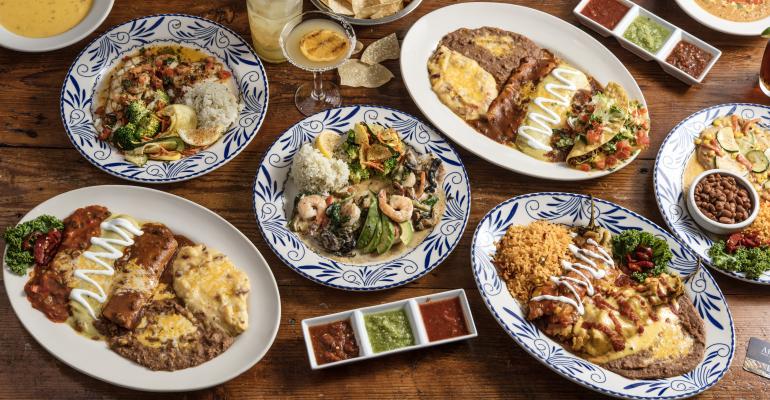James Young came to the U.S. in 1974 with $500 in his pocket and a dream. He opened a Chinese restaurant, Chinese Kitchen[LZ1] , in 1975 and it was incorporated in 1979 and began expansion throughout Texas until it reached about 20 units. But it wasn’t enough for him. When two Chinese Kitchens opened too close to one another in Amarillo, Texas, Young had to figure out what to do with the long-term lease he had just signed.
That’s how Abuelo’s came about.
Young, alongside Chuck Anderson and Dirk Rambo, founded the now-26-unit Abuelo’s in 1989. The Mexican restaurant was one of the first in the area to serve authentic Mexican food rather than Tex-Mex, and now it has units in Arizona, Texas, Tennessee, South Carolina, Florida, Kansas, Oklahoma, and Virginia.
“You can see [the founders’] DNA throughout the concept. Whatever we do, it’s food and hospitality and a sense of wanting to give people the experience of being transported to a nicer restaurant in Mexico,” said Robert Lin, president of Abuelo’s.
The aim is for a more upscale experience with Mexican food.
“We don’t cater to the party crowd — not to say we don’t serve drinks, we serve some really good margaritas — but it is really trying to provide a nice experience,” said Lin.
Using P.F. Chang’s as a guide, Abuelo’s intentionally makes sure the front of each location is well-designed, so people are welcomed to a beautiful space.
The brand targets consumers from their mid- to late-30s to their 50s. As Lin described, it’s not a place for partying but an upscale Mexican restaurant where people can sit and dine in peace.
But the food is the shining star of the experience.
“If you look at our menu, you’ll see that we’ve got a lot of plates [that are] protein-based,” said Lin. “We’ve got things that we believe are more creative than what you would find in a typical Mexican restaurant.”
There’s also a lot of fish on the menu, something not typically seen in a lot of Mexican restaurants, said Lin. The fish is chosen by the customer and then it can be dry, grilled, or served with one of three sauces. The sauces are based on coastal Mexican flavors to transport the customer to a faraway place instead of their local Abuelo’s.
Abuelo’s hasn’t been immune to inflation. The company has had to take price, yet they have maintained their bottom line. Things like changing the tenderloin, which has seen more inflationary pressures than most other meat, to prime sirloin have helped cut costs.
“Our customer base is not the person that wants to go out to Ruth's Chris or can afford to go out to Ruth's Chris once a week,” Lin said. Abuelo’s has a lower price point and while it caters to an upscale clientele, it’s not at the price point of a Ruth’s Chris.
“I like to say, ‘We provide a $25 experience for $15.’ It’s probably more like a $45 experience for $25 these days, but that’s really what we’re about,” said Lin.
The chain has also adapted to consumer habits, meaning that as consumers want increasingly healthier foods, Abuelo’s has changed with the times.
“Being a relatively smaller chain, I think we can change course a little more quickly than some of the larger chains,” said Lin.
Healthier foods on Abuelo’s menu include the Superfood Enchilada, set to debut in February, as well as a stuffed poblano pepper filled with chicken, a protein that’s come down in price.
Initially, the chain had intended to grow rapidly after 2021, when it experienced one of its best years ever. The multi-year plan included two new restaurants in 2022, three in 2023, and four or five in the following years. That all changed with the supply chain issues brought about in 2022.
“I think the growth plans are just pushed off by 18 to 24 months,” Lin said.
However, that doesn’t mean the growth is stopping. Lin just signed a lease for a restaurant that should be open by the end of the year.
That’s growth for a brand that’s still family-run: Young is still involved and there is no private equity money. In fact, a large chunk of the shares of the restaurant company are owned by employees, along with Young and his friends and family.
“It goes to Mr. Young’s belief that he was given an opportunity in this country to make it, and it was all about understanding ownership and how ownership drives decisions that create long-term success,” Lin said. “So, we want to create that opportunity for employees.”
The average tenure for a manager at Abuelo’s is 15 years.
“A lot of them started with us in hourly positions and worked their way up the management ranks,” he said.
That’s due in large part to a program that trains hourly store employees to reach the ranks of manager.
“We’ve always felt that culture is so important to the success of our brand that we want to do as much as we can to encourage homegrown talent that by and large is always the best talent,” he said.





